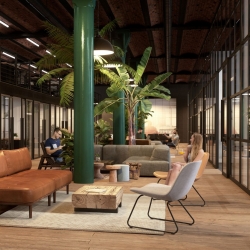To provide the best experiences, we use technologies like cookies to store and/or access device information. Consenting to these technologies will allow us to process data such as browsing behaviour or unique IDs on this site. Not consenting or withdrawing consent, may adversely affect certain features and functions.
The technical storage or access is strictly necessary for the legitimate purpose of enabling the use of a specific service explicitly requested by the subscriber or user, or for the sole purpose of carrying out the transmission of a communication over an electronic communications network.
The technical storage or access is necessary for the legitimate purpose of storing preferences that are not requested by the subscriber or user.
The technical storage or access that is used exclusively for statistical purposes.
The technical storage or access that is used exclusively for anonymous statistical purposes. Without a subpoena, voluntary compliance on the part of your Internet Service Provider, or additional records from a third party, information stored or retrieved for this purpose alone cannot usually be used to identify you.
The technical storage or access is required to create user profiles to send advertising, or to track the user on a website or across several websites for similar marketing purposes.
 Employers worried about rivals poaching their staff should be looking closer to home to spot their next competitor, a new study has claimed. In a survey of 3,000 UK employees by Synergy Creative, nearly half (47 percent) said that they would love to be their own boss, raising the prospect of them setting up in competition to their existing employer. Of those intending to find a new job in 2020, a third said their ideal job is to work for themselves, compared to 25 percent who are looking to move to another company. (more…)
Employers worried about rivals poaching their staff should be looking closer to home to spot their next competitor, a new study has claimed. In a survey of 3,000 UK employees by Synergy Creative, nearly half (47 percent) said that they would love to be their own boss, raising the prospect of them setting up in competition to their existing employer. Of those intending to find a new job in 2020, a third said their ideal job is to work for themselves, compared to 25 percent who are looking to move to another company. (more…)






 An 1860s warehouse located in the original Granada Studios estate in Manchester city centre has opened its doors as a coworking space for small and medium businesses.
An 1860s warehouse located in the original Granada Studios estate in Manchester city centre has opened its doors as a coworking space for small and medium businesses. 




 As AI continues to disrupt the world of work, a new report says upskilling and reskilling will be crucial in developing workers’ competencies to complement technological innovation. Yet according to the
As AI continues to disrupt the world of work, a new report says upskilling and reskilling will be crucial in developing workers’ competencies to complement technological innovation. Yet according to the 
 Data entry is the world’s most hated office technology task, with workers wasting about 40 percent of their day on this and other ‘digital admin’, a study has claimed. In a survey of 10,500 office workers spanning 11 countries, respondents said they average more than three hours a day on manual, repetitive computer tasks which aren’t part of their primary job and are ripe for human error.
Data entry is the world’s most hated office technology task, with workers wasting about 40 percent of their day on this and other ‘digital admin’, a study has claimed. In a survey of 10,500 office workers spanning 11 countries, respondents said they average more than three hours a day on manual, repetitive computer tasks which aren’t part of their primary job and are ripe for human error. 
 Younger decision makers are increasingly relying on technology such as emails, video conferencing and WhatsApp in negotiations with suppliers, rather than speaking to them face-to-face, new research from
Younger decision makers are increasingly relying on technology such as emails, video conferencing and WhatsApp in negotiations with suppliers, rather than speaking to them face-to-face, new research from 















January 21, 2020
The vaguery of workplace serendipity
by Neil Usher • Comment, Facilities management, Technology, Workplace design